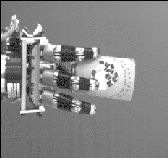Infants are able to plan their grasping actions both when the next action is directed toward themselves and when they are directly externally.
McCarty, M. E., Clifton, R. K. & Collard, R. R. (1999). Problem solving in infancy: The emergence of an action plan. Developmental Psychology, 35,1091-1101.
McCarty, M. E., Clifton, R. K., & Collard, R. R. (2001). The beginnings of tool use by infants and toddlers Infancy, 2, 233-256.
Berthier, N.E., Bertenthal, B.I., Seaks, J.D., Sylvia, M., Johnson, R., & Clifton, R.K. (2001). Using object knowledge in visual tracking and reaching , Infancy, 2, 257-284.

Autonomous agents make frequent use of knowledge in the form of categories -- categories of objects, activities, tasks, situations, and so on. We are developing methods that allow robots to learn categories for themselves through interaction with the environment.
Coelho, J., Piater, J., Grupen.R., Developing Haptic and Visual Categories for Reaching and Grasping with a Humanoid Robot.
Piater, J., Learning Visual Features to Recommend Grasp Configurations
Coelho, J, Grupen, R., Learning in Non-stationary Conditions: A Control Theoretic Approach
King, G., Oates, T., The Importance of Being Discrete: Learning Classes of Actions and Outcomes through Interaction
Morrison, C., Oates, T., King, G., Grounding the Unobservable in the Observable: The Role and Representation of Hidden State in Concept Formation and Refinement
Oates, T., Eylar-Walker, Z., Cohen, P., Toward Natural Language Interfaces for Robotic Agents: Grounding Linguistic Meaning in Sensors

We have cpnstructed an adaptive grasp controller that consists of a family of artificial potential in wrench space parameterized by contact resources and a switching function. We have shown that equilibria in one such controller correspond to optimal contact configurations for 2 and 3 contacts on regular convex polygons. Morover, we have demonstrated that a more general policy can be learned by estimating state from histories of observable variables. The haptic context of a grasp is determined by matching the dynamic behavior of the grasp controller to pre-established categories. This information reveals the geometric class of the object and can be used to address control compensation, object recognition, and contact allocation.
Grupen, R. and Coelho, C., Structure and Growth: A Model of Development for Grasping with Robot Hands.
Some Movies:

Piater, J., Grupen, R., Feature Learning for Recognition With Bayesian Networks
Piater, J., Grupen, R., Constructive Feature Learning and the Development of Visual Expertise
Piater JH, Grupen RA, Distinctive Features Should Be Learned
Some Movies:
- Brother, can you spare a dime? (AVI)
- Visual tracking (AVI)
M.T. Rosenstein and A.G. Barto, Robot Weightlifting by Direct Policy Search [pdf] [ps.gz]
Rosenstein, M., Grupen, R., Velocity-Dependent Dynamic Manipulability.
Some Movies:
- Robot weight lifting (MOV)


